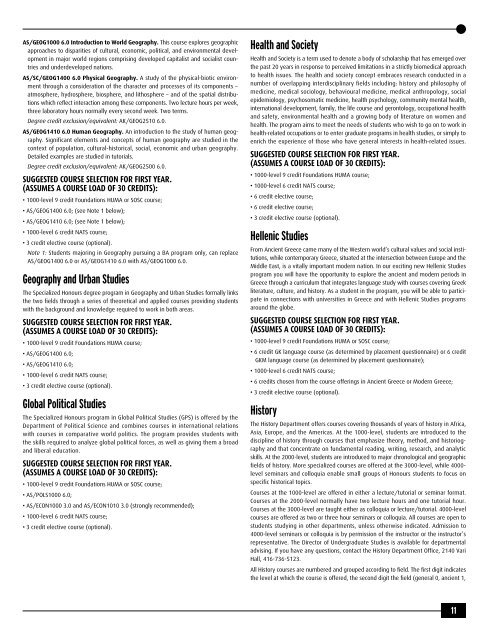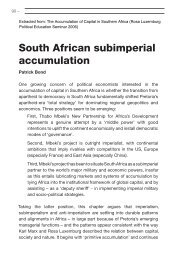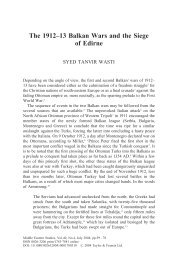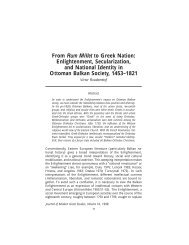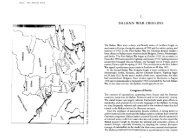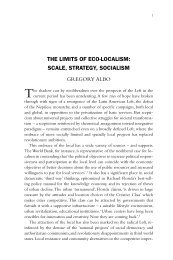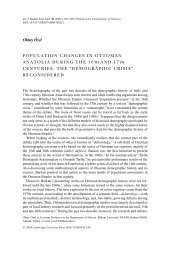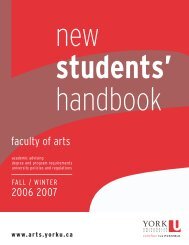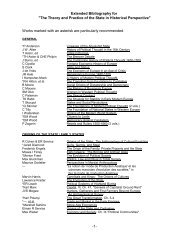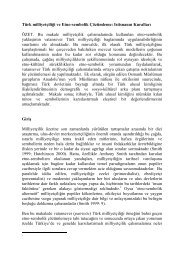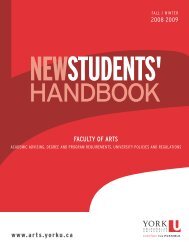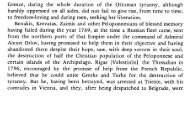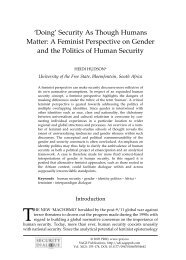FYCSG 05/06 REV2 - Faculty of Arts - York University
FYCSG 05/06 REV2 - Faculty of Arts - York University
FYCSG 05/06 REV2 - Faculty of Arts - York University
You also want an ePaper? Increase the reach of your titles
YUMPU automatically turns print PDFs into web optimized ePapers that Google loves.
AS/GEOG1000 6.0 Introduction to World Geography. This course explores geographic<br />
approaches to disparities <strong>of</strong> cultural, economic, political, and environmental development<br />
in major world regions comprising developed capitalist and socialist countries<br />
and underdeveloped nations.<br />
AS/SC/GEOG1400 6.0 Physical Geography. A study <strong>of</strong> the physical-biotic environment<br />
through a consideration <strong>of</strong> the character and processes <strong>of</strong> its components –<br />
atmosphere, hydrosphere, biosphere, and lithosphere – and <strong>of</strong> the spatial distributions<br />
which reflect interaction among these components. Two lecture hours per week,<br />
three laboratory hours normally every second week. Two terms.<br />
Degree credit exclusion/equivalent: AK/GEOG2510 6.0.<br />
AS/GEOG1410 6.0 Human Geography. An introduction to the study <strong>of</strong> human geography.<br />
Significant elements and concepts <strong>of</strong> human geography are studied in the<br />
context <strong>of</strong> population, cultural-historical, social, economic and urban geography.<br />
Detailed examples are studied in tutorials.<br />
Degree credit exclusion/equivalent: AK/GEOG2500 6.0.<br />
SUGGESTED COURSE SELECTION FOR FIRST YEAR.<br />
(ASSUMES A COURSE LOAD OF 30 CREDITS):<br />
• 1000-level 9 credit Foundations HUMA or SOSC course;<br />
• AS/GEOG1400 6.0; (see Note 1 below);<br />
• AS/GEOG1410 6.0; (see Note 1 below);<br />
• 1000-level 6 credit NATS course;<br />
• 3 credit elective course (optional).<br />
Note 1: Students majoring in Geography pursuing a BA program only, can replace<br />
AS/GEOG1400 6.0 or AS/GEOG1410 6.0 with AS/GEOG1000 6.0.<br />
Geography and Urban Studies<br />
The Specialized Honours degree program in Geography and Urban Studies formally links<br />
the two fields through a series <strong>of</strong> theoretical and applied courses providing students<br />
with the background and knowledge required to work in both areas.<br />
SUGGESTED COURSE SELECTION FOR FIRST YEAR.<br />
(ASSUMES A COURSE LOAD OF 30 CREDITS):<br />
• 1000-level 9 credit Foundations HUMA course;<br />
• AS/GEOG1400 6.0;<br />
• AS/GEOG1410 6.0;<br />
• 1000-level 6 credit NATS course;<br />
• 3 credit elective course (optional).<br />
Global Political Studies<br />
The Specialized Honours program in Global Political Studies (GPS) is <strong>of</strong>fered by the<br />
Department <strong>of</strong> Political Science and combines courses in international relations<br />
with courses in comparative world politics. The program provides students with<br />
the skills required to analyze global political forces, as well as giving them a broad<br />
and liberal education.<br />
SUGGESTED COURSE SELECTION FOR FIRST YEAR.<br />
(ASSUMES A COURSE LOAD OF 30 CREDITS):<br />
• 1000-level 9 credit Foundations HUMA or SOSC course;<br />
• AS/POLS1000 6.0;<br />
• AS/ECON1000 3.0 and AS/ECON1010 3.0 (strongly recommended);<br />
• 1000-level 6 credit NATS course;<br />
• 3 credit elective course (optional).<br />
Health and Society<br />
Health and Society is a term used to denote a body <strong>of</strong> scholarship that has emerged over<br />
the past 20 years in response to perceived limitations in a strictly biomedical approach<br />
to health issues. The health and society concept embraces research conducted in a<br />
number <strong>of</strong> overlapping interdisciplinary fields including: history and philosophy <strong>of</strong><br />
medicine, medical sociology, behavioural medicine, medical anthropology, social<br />
epidemiology, psychosomatic medicine, health psychology, community mental health,<br />
international development, family, the life course and gerontology, occupational health<br />
and safety, environmental health and a growing body <strong>of</strong> literature on women and<br />
health. The program aims to meet the needs <strong>of</strong> students who wish to go on to work in<br />
health-related occupations or to enter graduate programs in health studies, or simply to<br />
enrich the experience <strong>of</strong> those who have general interests in health-related issues.<br />
SUGGESTED COURSE SELECTION FOR FIRST YEAR.<br />
(ASSUMES A COURSE LOAD OF 30 CREDITS):<br />
• 1000-level 9 credit Foundations HUMA course;<br />
• 1000-level 6 credit NATS course;<br />
• 6 credit elective course;<br />
• 6 credit elective course;<br />
• 3 credit elective course (optional).<br />
Hellenic Studies<br />
From Ancient Greece came many <strong>of</strong> the Western world’s cultural values and social institutions,<br />
while contemporary Greece, situated at the intersection between Europe and the<br />
Middle East, is a vitally important modern nation. In our exciting new Hellenic Studies<br />
program you will have the opportunity to explore the ancient and modern periods in<br />
Greece through a curriculum that integrates language study with courses covering Greek<br />
literature, culture, and history. As a student in the program, you will be able to participate<br />
in connections with universities in Greece and with Hellenic Studies programs<br />
around the globe.<br />
SUGGESTED COURSE SELECTION FOR FIRST YEAR.<br />
(ASSUMES A COURSE LOAD OF 30 CREDITS):<br />
• 1000-level 9 credit Foundations HUMA or SOSC course;<br />
• 6 credit GK language course (as determined by placement questionnaire) or 6 credit<br />
GKM language course (as determined by placement questionnaire);<br />
• 1000-level 6 credit NATS course;<br />
• 6 credits chosen from the course <strong>of</strong>ferings in Ancient Greece or Modern Greece;<br />
• 3 credit elective course (optional).<br />
History<br />
The History Department <strong>of</strong>fers courses covering thousands <strong>of</strong> years <strong>of</strong> history in Africa,<br />
Asia, Europe, and the Americas. At the 1000-level, students are introduced to the<br />
discipline <strong>of</strong> history through courses that emphasize theory, method, and historiography<br />
and that concentrate on fundamental reading, writing, research, and analytic<br />
skills. At the 2000-level, students are introduced to major chronological and geographic<br />
fields <strong>of</strong> history. More specialized courses are <strong>of</strong>fered at the 3000-level, while 4000-<br />
level seminars and colloquia enable small groups <strong>of</strong> Honours students to focus on<br />
specific historical topics.<br />
Courses at the 1000-level are <strong>of</strong>fered in either a lecture/tutorial or seminar format.<br />
Courses at the 2000-level normally have two lecture hours and one tutorial hour.<br />
Courses at the 3000-level are taught either as colloquia or lecture/tutorial. 4000-level<br />
courses are <strong>of</strong>fered as two or three hour seminars or colloquia. All courses are open to<br />
students studying in other departments, unless otherwise indicated. Admission to<br />
4000-level seminars or colloquia is by permission <strong>of</strong> the instructor or the instructor’s<br />
representative. The Director <strong>of</strong> Undergraduate Studies is available for departmental<br />
advising. If you have any questions, contact the History Department Office, 2140 Vari<br />
Hall, 416-736-5123.<br />
All History courses are numbered and grouped according to field. The first digit indicates<br />
the level at which the course is <strong>of</strong>fered, the second digit the field (general 0, ancient 1,<br />
11


